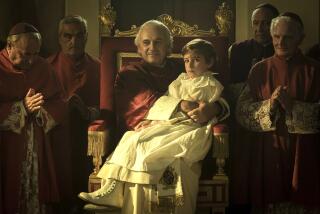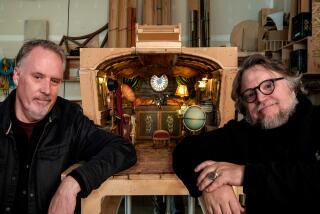Review: Roberto Benigni returns to a dark and unsettling ‘Pinocchio,’ this time as Gepetto
Did we really need yet another screen iteration of Carlo Collodi’s 1883 children’s book about the miraculous wooden boy with the nose that grows? If this latest stab at “Pinocchio” from Italian filmmaker Matteo Garrone is any indication, the answer is no, not really. But they made it anyway and you could do worse — and probably have if you saw the 2002 version which, like this new film, also stars Roberto Benigni. But in that widely panned retelling, the Oscar winner (“Life is Beautiful”), then around 50, preposterously played the title character (as well as directing) and not famed cobbler Geppetto, as he quite deftly does here.
Director Garrone, no stranger to grotesque imagery — his award-winning 2015 horror-fantasy “Tale of Tales” popped with it — has leaned into the beloved fable’s dark and unsettling elements, sprinkling it with touches of Fellini, Gilliam and Lewis Carroll. If it adheres more closely to the original text than some other adaptations, particularly Disney’s 1940 animated classic (where’s “When You Wish Upon a Star” when you need it?), the film remains mostly a picaresque obstacle course stacked with get-out-of-jail-free cards for our intrepid wooden friend.
Set in the hardscrabble 19th-century Italian countryside, the movie finds the lonely, impoverished Geppetto (what he’s been doing his entire life we never learn, but, y’know, just go with it) inspired to carve a puppet out of a log that, unbeknownst to him, has magical properties. The result is a life-size, walking-talking boy Geppetto names Pinocchio (Federico Ielapi), and they become instant parent and child. Still, when this elderly, bedraggled woodworker joyfully crows to his neighbors, “I have a son,” it somehow feels beyond creepy.
But Pinocchio has a mind of his own — how he knows and speaks as much as he does after coming to life is just another curious conceit — and soon finds himself separated from Geppetto and bouncing from one garish misadventure to another. It’s all in the service of learning how to become a real boy, but that goal gets lost in the shuffle, as does Geppetto’s declared but unseen search for his missing “son.” (We lose the woodworker for more than an hour.)
Among the many characters Pinocchio encounters en route are devious puppeteer Mangiafuoco (Gigi Proietti); the Fox and the Cat, an inept pair of slovenly conmen (Massimo Ceccherini, who cowrote with Garrone; and Rocco Papaleo); a young fairy (Alida Baldari Calabria), her older fairy self (Marine Vacth) and the grossly humongous snail (Maria Pia Timo) that tends to them both; a gorilla judge (Teco Celio) with an absurd way of ruling; and a giant tuna (Maurizio Lombardi) that befriends the puppet when he’s swallowed by a mammoth shark (a highlight sequence). The grasshopper (Davide Marotta) that jumps in to caution Pinocchio is a far chirp from the upbeat Jiminy Cricket of yore.
They’re a motley gallery of both humans and creatures with human qualities, the latter of which are rendered via Mark Coulier’s eye-popping prosthetic makeup designs instead of with CGI effects. Save the lovely fairy, who will wield perhaps the greatest power over Pinocchio, most of the other characters here, inspired by the source material as they may be, evoke such a carnival of random weirdness that they tend to be more off-putting than captivating.
It’s hard to say what children, clearly the film’s target audience, will make of all this. That the movie is generally more toothless than tense may be a plus, though a scene of Pinocchio hanging from a tree and left to die is hardly what you’d call kid friendly. Same goes for a painful sequence in which Pinocchio and a friend are transformed into donkeys.
The film’s frequent depictions of poverty, ugliness and desperation may also prove a bit much. The broadly accented English dubbing doesn’t help either.
Yet for all its flaws and missteps (more nose growing antics, please), the movie gets under your skin and holds interest, if only to find out not if, but how Pinocchio will reunite with his devoted Babbo (dad) and what the future might have in store for Geppetto’s lovingly crafted creation.
Speaking of the future, look for two more trips to the “Pinocchio” well: Guillermo del Toro’s stop-motion animated musical (on Netflix in 2021) and Disney’s live-action remake, directed by Robert Zemeckis and starring Tom Hanks as, yes, Geppetto.
‘Pinocchio’
In Italian with English dubbing
Rated: PG-13, for some disturbing images
Running time: 2 hours, 5 minutes
Playing: Starts Dec. 25, Vineland Drive-in, City of Industry; and in general release where theaters are open
More to Read
Only good movies
Get the Indie Focus newsletter, Mark Olsen's weekly guide to the world of cinema.
You may occasionally receive promotional content from the Los Angeles Times.










